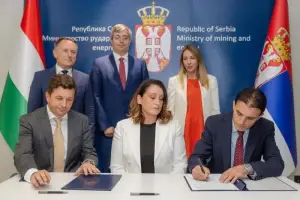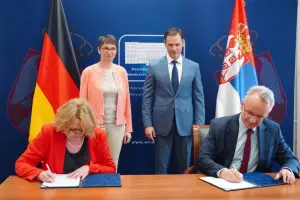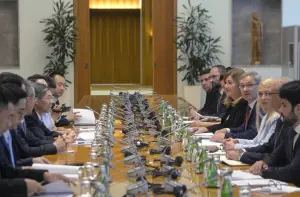- Serbia
Get to know Serbia
- Citizens
Culture and science
Health services
Pension and disability insurance
- Business
Employment
Economy
- Media
- Government
- Contact
Keep in touch
Contact form
Back
Keepin touch
Whether you have a question, comment, suggestion or any problem in the purview of the government, send us your message and we will try to respond as soon as possible. If your problem is not in our purview, we will forward your message to the relevant institution.
Q:
A:
Serbia, Egypt should improve economic cooperation
Belgrade,
24 February 2010
Serbian Minister of Trade and Services Slobodan Milosavljevic said today that economic cooperation between Serbia and Egypt should be improved and that there is great potential for increasing foreign trade exchange.
Speaking at a Serbian-Egyptian business forum held at the Serbian Chamber of Commerce, Milosavljevic said that this is the most important delegation of Egyptian businessmen that has ever visited Serbia.
The Egyptian delegation is headed by Minister of Trade and Industry Rachid Mohamed Rachid and the aim of its visit is to see the business environment in Serbia.
Milosavljevic said that this is not only a delegation of business leaders of Egypt, but of the Middle East and Africa as well. They should be present in Serbia, being the biggest and most promising country of the region.
He recalled that Serbia and Egypt have a tradition of political and economic cooperation going back more than 100 years.
The volume of trade exchange between Serbia and Egypt has increased in the past few years and reaches tens of millions of dollars per year, Milosavljevic said and recalled that in the 1970s and 1980s it stood at hundreds of millions of dollars.
Rachid said that the aim of the visit of the Egyptian businessmen to Serbia is to explore possibilities for investing in Serbia and for improving economic cooperation between the two countries.
He stressed that Serbia and Egypt should utilise the several free trade agreements they have with other countries. He called on Serbian business people to use Egypt as a base for their business activities in the Middle East and Africa.
President of the Serbian Chamber of Commerce Milos Bugarin said that Serbia is making efforts to revive and intensify cooperation with countries that were traditional partners from the time of former Yugoslavia.
Serbia’s main exports to Egypt used to be cars, tractors, machines and chemical products, while Egypt used to supply fruits, cotton, rice, vegetables, air conditioning equipment and ceramics, said Bugarin.
The total annual trade between the two countries doubled during the period from 2005 to 2008, going up from $20 million to $50 million. In 2009, trade fell and stood at $35 million, he said.
This does not even come close to reflecting the true strength of the economies of the two countries and joint work must be done on this issue. Hopefully the visit by the Egyptian delegation will be helpful, said Bugarin.
Future cooperation between Serbia and Egypt should develop through closer contacts between companies, aimed at the transfer of technology in the production and services sectors, he said.
Serbia would be an ideal partner for Egyptian investors because it has free trade agreements with Russia, CEFTA signatory countries, the EFTA states, Belarus and Turkey, Bugarin said.
Egyptian investors could also take part in the privatisation process in Serbia, in infrastructure projects, as well as setting up joint production in the food industry, he said.
The Egyptian delegation is headed by Minister of Trade and Industry Rachid Mohamed Rachid and the aim of its visit is to see the business environment in Serbia.
Milosavljevic said that this is not only a delegation of business leaders of Egypt, but of the Middle East and Africa as well. They should be present in Serbia, being the biggest and most promising country of the region.
He recalled that Serbia and Egypt have a tradition of political and economic cooperation going back more than 100 years.
The volume of trade exchange between Serbia and Egypt has increased in the past few years and reaches tens of millions of dollars per year, Milosavljevic said and recalled that in the 1970s and 1980s it stood at hundreds of millions of dollars.
Rachid said that the aim of the visit of the Egyptian businessmen to Serbia is to explore possibilities for investing in Serbia and for improving economic cooperation between the two countries.
He stressed that Serbia and Egypt should utilise the several free trade agreements they have with other countries. He called on Serbian business people to use Egypt as a base for their business activities in the Middle East and Africa.
President of the Serbian Chamber of Commerce Milos Bugarin said that Serbia is making efforts to revive and intensify cooperation with countries that were traditional partners from the time of former Yugoslavia.
Serbia’s main exports to Egypt used to be cars, tractors, machines and chemical products, while Egypt used to supply fruits, cotton, rice, vegetables, air conditioning equipment and ceramics, said Bugarin.
The total annual trade between the two countries doubled during the period from 2005 to 2008, going up from $20 million to $50 million. In 2009, trade fell and stood at $35 million, he said.
This does not even come close to reflecting the true strength of the economies of the two countries and joint work must be done on this issue. Hopefully the visit by the Egyptian delegation will be helpful, said Bugarin.
Future cooperation between Serbia and Egypt should develop through closer contacts between companies, aimed at the transfer of technology in the production and services sectors, he said.
Serbia would be an ideal partner for Egyptian investors because it has free trade agreements with Russia, CEFTA signatory countries, the EFTA states, Belarus and Turkey, Bugarin said.
Egyptian investors could also take part in the privatisation process in Serbia, in infrastructure projects, as well as setting up joint production in the food industry, he said.
-
 Belgrade, 11 July 2025
Belgrade, 11 July 2025Potential for improving cooperation with Belarus in many areas
-
 Požega, 5 July 2025
Požega, 5 July 2025Section of Pakovraće - Požega highway officially opened
-
 Belgrade, 2 July 2025
Belgrade, 2 July 2025Technical specifications defined for Serbia-Hungary oil pipeline
-
 Belgrade, 30 June 2025
Belgrade, 30 June 2025IMF confirms Serbia successfully implementing all agreed reforms
-
 Belgrade, 27 June 2025
Belgrade, 27 June 2025Double Taxation Avoidance Agreement with Germany signed
-
 Kostolac, 25 June 2025
Kostolac, 25 June 2025Construction of Kostolac wind farm nearing completion
-
 Belgrade, 24 June 2025
Belgrade, 24 June 2025Government supports request for new postponement of sanctions against NIS
-
 Belgrade, 23 June 2025
Belgrade, 23 June 2025Procedures to facilitate sale of Serbian products to China to be accelerated
-
 Belgrade, 21 June 2025
Belgrade, 21 June 2025Serbia receives first funds under Growth Plan for the Western Balkans
-
 Belgrade/Cairo, 20 June 2025
Belgrade/Cairo, 20 June 2025New phase in relations with Egypt in field of agriculture
